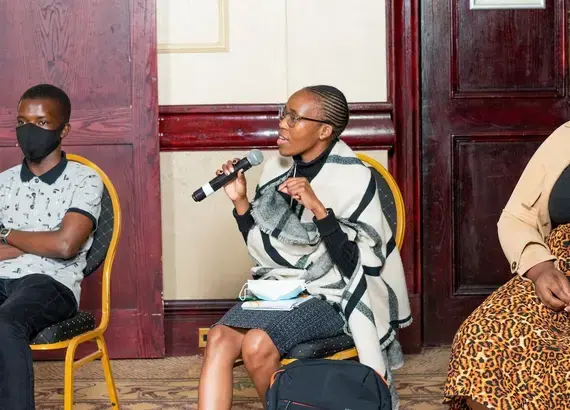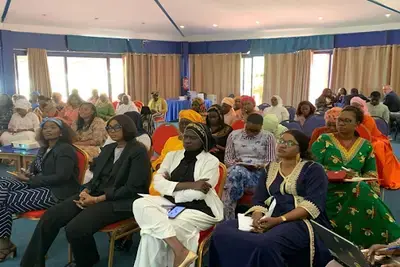
Success Story
Speak Youth to Power: Partnering with Young People to Achieve Constitutionalism
Africa’s young people are a strong political force, as demonstrated by a rise in social movements and political protests across the continent, such as the movement for democracy and term limits in Uganda, the #EndSARS movement in Nigeria, and demonstrations protesting the military coup in Sudan. However, young people continue to be excluded from decision-making. The erosion of the rule of law across the continent, exemplified by attempts to amend or eliminate presidential term limits, will undoubtedly have the largest impact on the current generation. Without the fundamentals of constitutionalism embodied in elections, institutions, and the rule of law, citizens – particularly groups who are marginalized and excluded from politics – will look beyond democracy for solutions to pressing public problems.
How are the principles of constitutionalism, term limits, and democracy resonating with young people in Africa, and what would drive their mobilization? Today’s generation of youth are struggling to reach social and economic markers for adulthood, and they have the largest proportion of unemployed and underemployed people compared with any other generation. They are also contending with complex problems, such as the climate crisis and increased political polarization. The barriers preventing young people from transitioning to adulthood are greater than ever. For many youth, constitutionalism is simply a word that has little to no bearing on their daily life. While high-level discussions are gaining traction on the global stage, efforts to reach and mobilize young citizens at the local and national levels are critical to sustaining momentum.
In recent years, youth-led and youth-inclusive civil society organizations have emerged to demand respect for constitutionalism, including presidential term limits. Civil society organizations are using their collective agency and convening power to contribute to discussions, press for constitutional reforms, and advocate for greater accountability from current and future elected leaders. Over the past three years, NDI has partnered with civil society organizations through the Constitutional Term Limits Initiative to promote constitutionalism and term limits across sub-Saharan Africa. Partners include the Katiba Institute in Kenya; AfricTivistes, a regional coalition based in Senegal; and Tournons La Page, a regional network of over 250 organizations working across ten countries. During the recent Africa-wide summit in Gaborone, Botswana, representatives from each organization and other panelists described their efforts to motivate and engage young people across the continent.
Activists working across regions stress the need for increased intergenerational solidarity and accountability from neighboring countries, particularly countries that have strengthened or upheld term limits in recent years. Aisha Dabo, co-founder and coordinator at AfricTivistes, urged other countries to ratify and implement the African Charter on Democracy, Elections, and Governance, which sets the guidelines that African countries should follow concerning governance. Several panelists discussed the challenge of operating in exclusive echo chambers without consulting the general public or ensuring that citizens understand how constitutionalism impacts their daily life. For example, how is the inability to access quality healthcare or education connected to term limits, and is that message being clearly communicated? Finally, James Nkuubi, an activist and scholar in Uganda, discussed the importance of defining success, not by external standards, but by the people who have a vested interest in the change they are seeking to achieve.
What else can be done to strengthen young people’s contributions to constitutionalism and democratization? Several young leaders provided suggestions on how to better meet young people where they are and foster collaboration:
-
Movements should be both political and educational. Activists should spread a broad understanding of constitutional goals and clearly demonstrate their relevance to young people’s lives. Youth, particularly those who are traditionally excluded from decision-making, need salient reasons to care about upholding or amending the constitution and a better understanding of how these concepts, and greater accountability, can have a direct impact on their lives and livelihood.
-
Increase opportunities for peer-to-peer collaboration across Africa and learning exchanges between young people within Africa and around the world. During the Summit, NDI partners discussed opportunities to share challenges, research and resources, as well as consult with other experts including constitutional specialists, legal professionals, and civil society activists whose work aligns with theirs. Additionally, young leaders who are active in advocating for the rights of people with disabilities and LGBTQI+ communities have unique experiences and success stories to contribute.
-
Increase opportunities and safe spaces for meaningful collaboration across generations. Older, established civil society leaders are also guilty of stereotyping young people and refusing to invest in their leadership. Combatting this practice requires targeting harmful social norms that exclude young people of diverse identities and backgrounds, creating a culture of inclusion through ensuring age diversity and gender balance at all levels, and ascension planning within civil society organizations. During the Summit, participants discussed a new role for older, established leaders that recognizes and respects their expertise while creating a leadership role for young people now - a position that emphasizes listening to young people, power-sharing, collective decision-making and distributed forms of leadership.
Through NDI’s global “Speak Youth to Power” campaign, the Institute is championing solidarity across generations and bolstering opportunities for peer-to-peer collaboration. Following the Summit, NDI will continue supporting partners as they expand their efforts to champion constitutionalism, including reaching more diverse audiences, establishing a community of practice and identifying opportunities for collaboration. Read more about this initiative and the commitments leaders can take to create and sustain opportunities for young people to have decision-making power in politics.
The Summit was part of Botswana’s commitments for the year of action, following the global 2021 Summit for Democracy.



